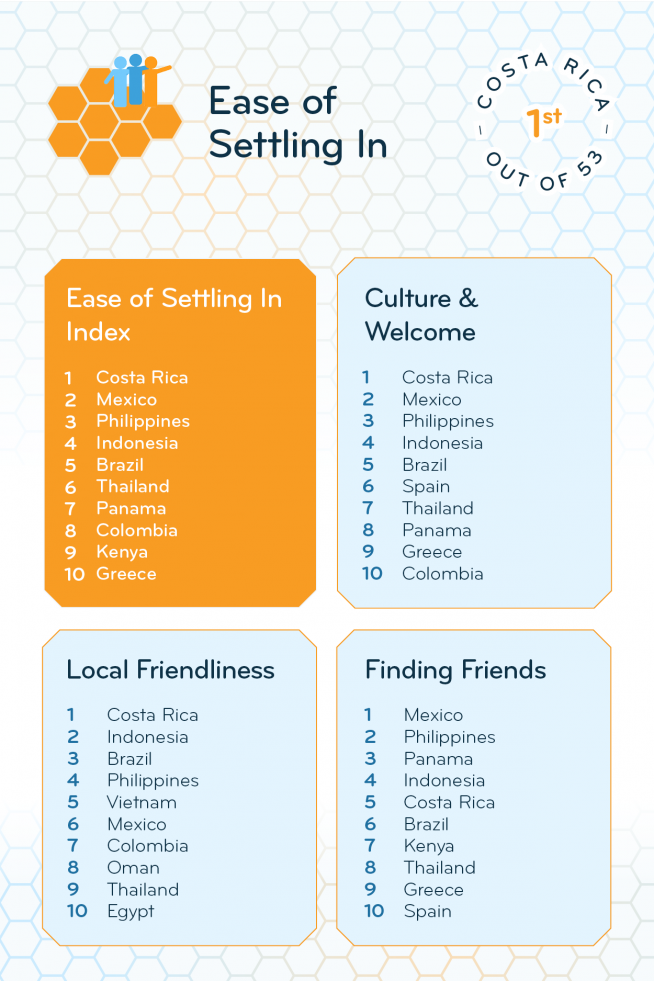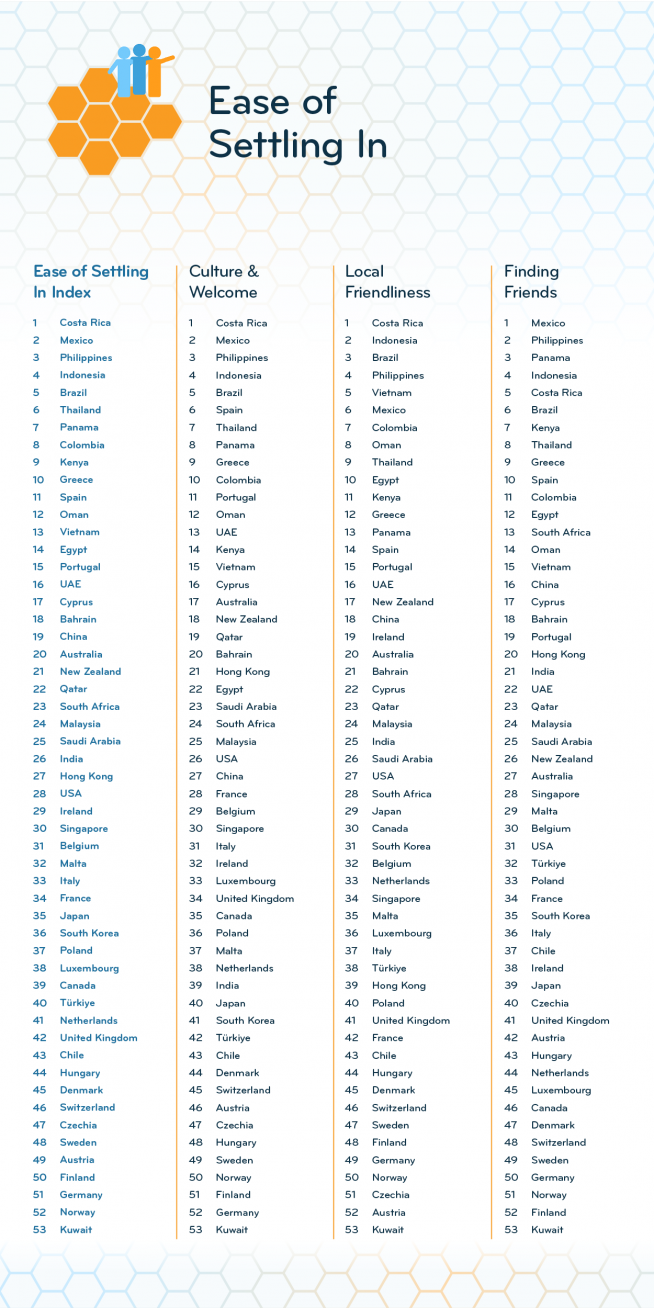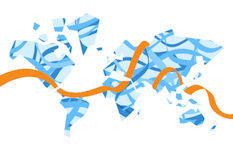From Friends to Friendliness: Where It’s Easy to Settle In in 2024
- Methodology
- Feeling at Home in Costa Rica (1st)
- 2nd-Placed Mexico Offers a Great Social Life
- No Lack of Local Friends in the Philippines (3rd)
- Struggling to Connect in Kuwait (53rd)
- Norway (52nd) Is Chilly in More Ways than One
- No Warm Welcome in Germany (51st)
- Trends in the Top 10
- Trends in the Bottom 10
- The Biggest Winners in 2024
- The Biggest Losers in 2024
- Full Ranking
- Further Reading
The Top 10
Methodology
The Ease of Settling In Index is composed of three subcategories with two to three factors each.
The Finding Friends Subcategory considers whether expats are happy with their social life; if they have a personal support network in their new home abroad; and what they say about making local friends.
Culture & Welcome summarizes whether expats feel welcome and at home, as well as how easy it is to get used to the local culture of their host country.
And the Local Friendliness Subcategory factors in the friendliness of the local population — both in general and towards foreign residents.
In 2024, a total of 53 destinations met the minimum sample size of 50 respondents and thus ranked in the index.
Feeling at Home in Costa Rica (1st)
Costa Rica is the undisputed winner of the 2024 Ease of Settling In Index. The country ranks 1st for two of the three subcategories and is within the top 10 across all factors of the index.
Expats feel very welcome (88% vs. 63% globally) and at home (83% vs. 58%) in Costa Rica. They also say it’s easy to get used to the local culture: over a third (35%) agree completely with this point, compared to 21% worldwide. Plus, they rate the local population the friendliest worldwide! In fact, nine in ten (90%) rate the general friendliness of locals (vs. 63% globally) and friendliness towards foreign residents (vs. 61% globally) favorably.
“The locals are generally gentle, lovely people. You learn to adapt to a ‘Pura Vida’ life in Costa Rica.” – Canadian expat
It’s hardly surprising that a large share of expats in Costa Rica have a personal support network (71% vs. 55% globally) and a fulfilling social life (67% vs. 52%). Close to three in five (58%) agree that finding local friends is easy, 20 percentage points above the worldwide average of 38%. Consequently, they are less likely to stay in the so-called expat bubble: just 26% say that their friends are mostly other expats (vs. 37% globally).
2nd-Placed Mexico Offers a Great Social Life
Ever since the first edition of the Expat Insider survey in 2014, Mexico has never dropped out of the top 3 for Ease of Settling In — and the same is true once again, with the country seeing 2nd place in 2024.
Like Costa Rica, Mexico receives top 10 results for all factors of the index. It is the country where expats find it the easiest worldwide to get used to the local culture, and where they’re happiest with their social life. Close to three-quarters (73%) rate the latter factor positively, and over a third (35%) give it the best possible rating (vs. a global 52% and 21%, respectively).
“Social connections seem important to people here, so they are eager to make new friends, including expats.” – US American expat
In fact, over four in five (85%) feel welcome in the country (vs. 63% globally) and agree that Mexicans are friendly towards foreign residents (vs. 61% globally). Two-thirds (67%) agree it’s easy to make local friends (vs. 38% globally), and for 31% of respondents, their friends consist of mostly Mexicans (vs. 17% globally). As a possible consequence, expats are likely to find themselves with a personal support network in Mexico (1st for this factor).
No Lack of Local Friends in the Philippines (3rd)
The Philippines lands on the podium of the Ease of Settling In Index again, defending its 3rd place of 2023.
Like Mexico and Costa Rica, expats appreciate the different factors of the index. The Philippines’ “worst” result is a 6th rank regarding personal support networks. Over two in five expats (41%) are mostly friends with local residents, compared to just 17% of respondents worldwide. Indeed, making local connections is a breeze according to 69% of respondents (vs. 38% globally); and a similar share (68%) are happy with their social life (vs. 52% globally).
“I love the free and easy lifestyle. Everybody is open for a chat.” – British expat
The Philippines ranks 4th for Local Friendliness, and around four in five respondents feel both welcome (85% vs. 63% globally) and at home (78% vs. 58%). With such a warm welcome — and the fact that a large share moved there for love (18%) or to retire (18%) — it follows that well over half of expats in the Philippines (58%) plan to stay possibly forever (vs. 34% globally).
Struggling to Connect in Kuwait (53rd)
As in 2023, Kuwait ranks last (53rd out of 53 countries) in the Ease of Settling In Index. In fact, it has consistently placed in the bottom 10 since the first year of the survey in 2014.
Only about a quarter of expats in Kuwait (26%) feel welcome there (vs. 63% globally). Rather, around half don't feel at home in the country (49% vs. 23% globally) and say it’s difficult to get used to the local culture (47% vs. 21% globally). Expats rank Kuwait dead last when it comes to Local Friendliness (53rd), and less than a quarter (22%) are happy with their social life there (vs. 52% globally).
And although 57% of respondents in Kuwait say they’ve already been there for five years or more (vs. 48% globally), the majority (53%) is still only friends with fellow expats (vs. 37% globally). This is possibly because making local friends is difficult: over three in five expats (61%) agree, 20 percentage points more than the global average of 41%.
Norway (52nd) Is Chilly in More Ways than One
Placing in the bottom 10 of the Ease of Settling In Index is nothing new for Norway. However, its 52nd place out of 53 countries in 2024 is its worst result yet.
“No matter how advanced my Norwegian language skills are, I still can't seem to make Norwegian friends.” – Kenyan expat
Two-thirds of all respondents in Norway (67%) find it difficult to make local friends (vs. 41% globally), and close to half (49%) are unhappy with their social life (vs. 29% globally). When asked about their concerns prior to relocating to the country, higher-than-average shares of expats cite the language barrier (45% vs. 35% globally) and a fear of isolation (30% vs. 25% globally).
Once in the country, less than half (49%) feel at home (vs. 58% globally), and two in five (40%) rate the friendliness of the local population negatively (vs. 19% globally). Overall, Norway is in the bottom 3 (52nd) when it comes to getting used to the local culture.
No Warm Welcome in Germany (51st)
Like Kuwait and Norway, finding Germany in the lower end of the Ease of Settling In Index isn't much of a surprise. The country has consistently ranked in the bottom 10 of the index since 2017, and places 51st out of 53 in 2024.
Expats continue to struggle with feeling at home in Germany (52nd), and around a third (32%) don't feel welcome (vs. 17% globally). Both the German culture (51st) as well as the (perceived) unfriendliness of the locals (51st) takes some getting used to. Only 39% of expats find that Germans are friendly towards foreign residents (vs. 61% globally). And close to two-thirds (65%) struggle with making local friends (vs. 41% globally).
“It’s hard to make friends with Germans, as they usually have their circle of friends from kindergarten or school.” – Czech expat
Trends in the Top 10
- Costa Rica
- Mexico
- Philippines
- Indonesia
- Brazil
- Thailand
- Panama
- Colombia
- Kenya
- Greece
Half of the top 10 of the Ease of Settling In Index can be found in Central and South America: Brazil (5th), Panama (7th), and Colombia (8th) join Costa Rica (1st) and Mexico (2nd).
These five countries see very similar results: expats are happy across all factors of the index. Only the social life in Colombia doesn’t fully delight expats: 58% rate it favorably. While this is a better result than the global average of 52%, it can’t compare with Mexico’s 73%. Respondents in these countries are unlikely to stay in the expat bubble, too. In Brazil and Colombia, just 14% are mainly friends with other internationals. Panama is the only exception here: 43% say their social circle consists of mostly other expats (vs. 37% globally).
In addition to the Philippines (3rd), two Southeast Asian countries make the top 10: Indonesia (4th) and Thailand (6th). Once again, expats are happy with their life across all the different aspects of the index. Indonesia even ranks as one of the friendliest countries worldwide (2nd) — beaten only by Costa Rica.
Kenya (9th) and Greece (10th) round out the top 10. Both stand out for their results in the Finding Friends Subcategory in particular (7th place for Kenya; 9th for Greece).
Trends in the Bottom 10
- Hungary
- Denmark
- Switzerland
- Czechia
- Sweden
- Austria
- Finland
- Germany
- Norway
- Kuwait
A staggering nine of the bottom 10 countries in the Ease of Settling In Index are found in Europe.
Norway (52nd) is joined by Finland (50th), Sweden (48th), and Denmark (45th). Expats in these Nordic countries especially struggle with the (perceived) unfriendliness of the population, find it hard to make local friends, and don't feel welcome — Denmark’s 44th place for the latter is in fact the “best” result among these factors, while Finland ranks last for finding local friends.
The so-called D-A-CH region, which includes Germany (51st), Austria (49th), and Switzerland (46th), paints a similar picture. Expats don’t feel welcome, struggle to get used to the culture, can’t seem to make local friends, and find the population to be rather unfriendly. In Austria, more than double the global average say people aren’t nice towards foreign residents (41% vs. 20% globally). Only last-ranked Kuwait receives a worse result for this factor.
The situation isn't quite as dire in Czechia (47th) and Hungary (44th), though expats feel unwelcome and think the population could be friendlier, too.
The Biggest Winners in 2024
New Zealand jumped 16 places to rank 21st in the 2024 Ease of Settling In Index. Across the board, expats rate the various factors of the index more favorably. For example: close to two in five respondents (39%) agree completely that Kiwis are friendly (vs. 28% globally). In 2023, 30% said the same.
Following a bottom 10 position in the index in 2023 (49th out of 53), South Korea has risen in the ranks to place 36th out of 53 countries in 2024. It is still one of the worst destinations when it comes to the ease of getting used to the local culture (46th). However, expats feel much more welcome (58% vs. 46% in 2023) and are less likely to say they don’t feel at home in the country (19% vs. 36% in 2023).
Like South Korea, Qatar also improved by 13 places. It now ranks 22nd in 2024. Among other things, expats report increased satisfaction with their social life (60% vs. 50% in 2023). And two-thirds (67%) find that locals are friendly towards foreign residents, compared to 58% who said the same in 2023.
The Biggest Losers in 2024
Not only is Finland in the bottom 10 of the Ease of Settling In Index (50th), it's also the biggest loser after falling 19 places in one year. Expats already didn’t find it easy to make Finnish friends the previous year (45% negative answers), but in 2024, a staggering seven in ten (70%) say it’s difficult to make local connections. And only around two in five (42%) feel welcome in Finland, compared to 69% of respondents in 2023.
Canada faces similar losses. While 54% of expats in 2023 were satisfied with their social life, only 41% say the same in 2024. And the share of respondents who feel at home in Canada has gone down 18 percentage points within one year (47% vs. 65% in 2023). Because of these changes, as well as losses across the remaining aspects of the index, Canada fell 16 places to 39th in the 2024 Ease of Settling In Index.
After a mediocre 27th place in 2023, Türkiye has tumbled down the ranks to place 40th in 2024. The country saw the biggest drops in the Local Friendliness (26th to 38th) and Culture & Welcome (29th to 42nd) Subcategories. It now ranks in the bottom 10 for feeling at home (47th). And while less than one in five respondents (19%) found that the locals were unfriendly towards foreign residents in 2023, this share has grown to three in ten (30%) in 2024.
Full Ranking
Further Reading
- The Best & Worst Countries for Living Abroad in 2024
- Brazil’s Locals Are the Friendliest towards Foreigners
- Admiring Finland’s Beautiful Landscapes Comes at a Cost
- Germany Unwrapped: Expats Give the Worst Rating Yet
- Indonesia Offers a Warm Welcome & Great Finances
- Kuwait Turns Up the Heat in More Ways than One
- Mexico Continues to Delight Expats in 2024
- Expat Insider 2023 | Expat-Friendly Places: Navigating the Ease of Settling In




